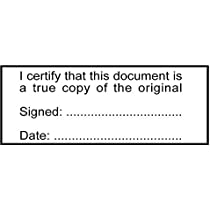ALL OF THE INFORMATION YOU NEED ABOUT NOTARIZATION DOCUMENTS IN ONE PLACE
Knowledge Center
Helpful information about notarization documents
Certifying True Likeness In Photographs And Identification Documents
Sometimes, organizations and institutions both in Canada and abroad may require you to provide Certified True Copies of documents before they can offer their services or address your inquiries. In the province of Ontario, the task of certifying copies as identical to the original falls exclusively under the authority of notary publics.
Certified copies are authentic duplicates of original documents, ensuring their accuracy and reliability. It eliminates the need to send in the originals, minimizing the risk of loss, theft, or damage during transit.
There are two distinct types of certified copies:
- Certified True Copy: This refers to a copy of a document that is issued by the government office or authority that originally issued the document. It is an official duplication of the original document, certified by the same governmental entity.
- Traditional Certified Copy: In contrast, a traditional certified copy is a photocopy of a document that has been certified by a notary public. The notary public, an authorized professional, verifies the authenticity of the photocopy and confirms that it is a true and accurate representation of the original document.
Both serve as reliable and legally recognized duplicates of important documents. The specific type required may depend on the purpose and the requirements set by the requesting organization or individual.
Some examples are, as follows:
- Health Card
- Ontario Age of Majority
- Marriage Certificate
- Passport
- Driver's License
They also serve different purposes, whether for government applications, court proceedings, or commercial requirements. For instance, when applying for a replacement document, such as proof of citizenship, a certified copy with a photo identification may be necessary or in a situation where official transactions require identification, such as cashing in your RRSP (Registered Retirement Savings Plan), will also often require certified copies of the original documents.
Some final notes, original documents can be in any language, unless you are sending it to an English speaking country they do not have to be translated into English, and they can belong to someone else; they need not be your own documents.
What Are Some Common Multi-Page Documents That Require Certification?
- Passports: Often consist of multiple pages, including personal information, visa stamps, and travel history pages. Each page may need to be certified as a true copy.
- Academic Transcripts: Transcripts from educational institutions, especially for individuals with extensive educational backgrounds, can span multiple pages. Each page may require certification.
- Medical Records: Can comprise multiple pages documenting a patient's medical history, test results, diagnoses, and treatment plans. Each page may need to be certified as a true copy.
- Financial Statements: Comprehensive financial statements, such as annual reports or financial audits, may be multi-page documents. If certified copies of these statements are required, each page might need to be certified.
- Legal Contracts and Agreements: Including multi-page documents such as employment contracts or rental agreements, may require certification of each page to ensure the accuracy of the entire document.
- Real Estate Documents: Purchase agreements, mortgage contracts, or lease agreements often involve multiple pages. Certification may be needed for each page to validate the authenticity of the entire document.
These examples highlight multi-page documents commonly encountered when obtaining certified copies. However, the specific documents that require certification can vary based on the requirements of the requesting organization or individual. Unless stipulated otherwise by your institution, a multi-page document only necessitates one seal. Our Notary will indicate the number of pages in the document near their signature and will apply their signature stamp to each page.

Using Your Originals For Another Country
There are various situations where your original documents (located in or around Richmond Hill), may be needed for use in another country. Some common scenarios include:
- Immigration and Visa Applications: When applying for immigration or a visa to another country, you may need to submit original documents such as birth certificates, marriage certificates, educational degrees, or employment records from Ontario.
- Employment Opportunities: Certain job opportunities abroad may require you to provide original documents to validate your qualifications, work experience, or professional certifications obtained in Ontario.
- Educational Pursuits: If you plan to study at a foreign educational institution, they may require your original Ontario educational transcripts, diplomas, or degrees for admission or transfer of credits.
- International Business Transactions: Engaging in international business activities may involve presenting original business documents, such as certificates of incorporation, partnership agreements, or commercial contracts from Ontario.
- Legal Proceedings: If you are involved in legal matters, such as litigation or estate administration, and there is an international component, original documents from Ontario may be necessary to support your case.
- Consular or Embassy Requirements: Consular services or embassies of foreign countries often require original documents, such as birth certificates or marriage certificates, to provide services such as notarizations, certifications, or visas.
Factors That Can Delay The Notarization Process
A certified true copy can only be made from the original document. Therefore, providing a duplicate document will not suffice. The notary public will refrain from certifying a true copy of an original document if:
- The document has been altered in any way, such as being glued to a cardboard, punched with a hole, or marked with a pen.
- Certain words or sections of the document have been crossed out.
- The text of the document is written in lead pencil, which may not provide a clear and permanent record.
- The document contains indistinct text or details, making it difficult to ascertain its contents.
- The document is not signed by the authorized personnel or signatory required for its validity.
- The document has been laminated, or the text has been intentionally obscured, compromising its authenticity.
It's important to ensure that the original document is in a pristine and unaltered state to facilitate the certification process. Any of the aforementioned factors may hinder the notary public from providing a certified true copy of the document.

Step-by-Step Guide to Obtaining a Certified True Copy
- Schedule an appointment with us.
- Gather your original documents that need to be certified. Ensure you have the complete set of documents that you want to have certified.
- Meet with our notary at the appointed time, bringing along your original documents and an exact copy of each original document. This involves making photocopies or digital scans of the originals.
- The notary public will carefully compare the copies to the corresponding original documents to verify their accuracy and ensure that all information matches.
- If the copies are found to be identical to the originals, our notary will affix their official stamp or seal onto the copies.
- After stamping the copies, notary will sign and seal each document, certifying it as a "certified true copy." This indicates that the copies are authentic and faithful reproductions of the original documents.
- It's important to note that certified true copies can be made for both official and unofficial documents. They can be created for documents in any language. However, if the certified copies are intended to be used in an English-speaking country, it may be necessary to provide an English translation of the documents.
Following these steps will help you obtain certified true copies of your original documents, which can be used as reliable proof or evidence in various contexts.
Contact Us
FAQs
Got a question about a Certified True Copy? We’re here to help.










